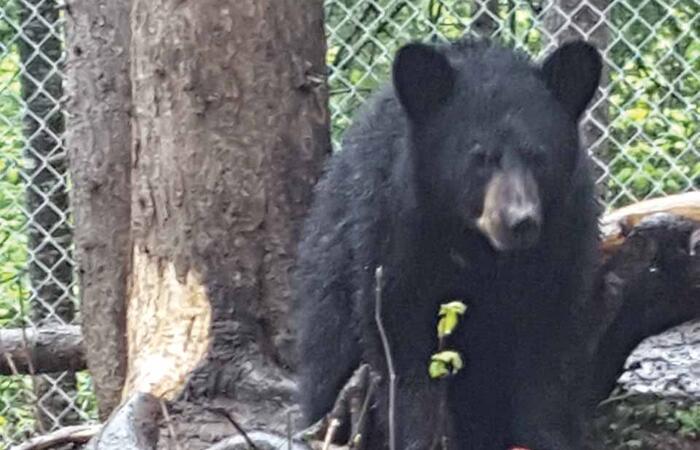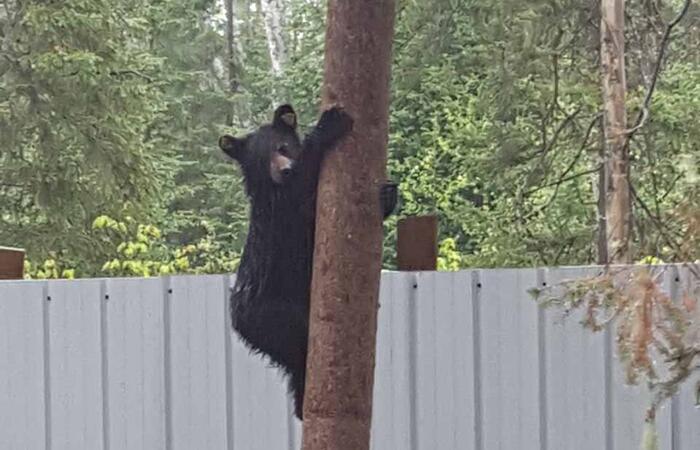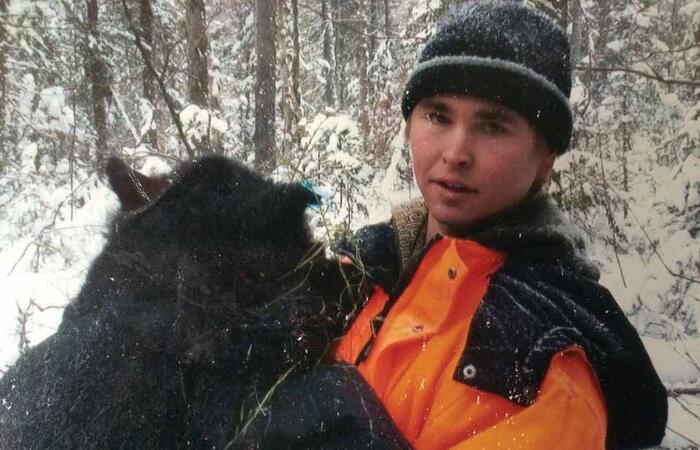When David Traintinger opened the door to his log home in Nipigon, he looked exactly as I had imagined: an outdoorsy, no-frills, content-with-the-world sort of man. He reached out his hand, looked at me with his intense bright eyes, and I immediately knew I was in the presence of someone good and kind.
If I had to give David a name I would call him Mukoosh or “Little Bear”. Since the early 1990’s David, his wife Wendy, and their four children have provided a refuge for orphaned bear cubs, caring for them and then, with the assistance of the Ministry of Natural Resources, releasing them back into the wild.
It has been a wonderful journey. It all began when the provincial government transferred the responsibility of “nuisance” bears from the MNR to the municipalities. David received a request from the MNR to look after two orphaned cubs that were set to travel to a refuge in the Aspen Valley in Huntsville. He and his sons immediately went to work and created an enclosure, and with the assistance of a local grocery store, fed the cubs a variety of discarded fruits and vegetables.
“We were inexperienced,” David admits. “For example, the bears were still not hibernating, although it was December.” David’s son, David Jr., also known as Little Man, read the well known novel The Bears and I and discovered why. They had been feeding the bears too well. A decline in the amount of food available to the bears would trigger the hibernation instinct. The food flow was slowed and then stopped, and finally the bears went into their den and slept away the cold Northwestern Ontario winter.
Over the years, the Traintinger household has seen about fifty bear cubs in their sanctuary. Supporting as many as a dozen cubs at a time, the enclosure has been a temporary home for single cubs and siblings, some as young as a few weeks. David has taken several courses including chemical immobilization and relocation, and black bear trap and transfer. He has also sat in on several lectures by Dr. Marty Obard, the bear “guru” of Ontario, to increase his understanding of these beasts. The enclosure itself has undergone several renovations, including a 4 x 4 x 80 foot long tunnel that the Jr. Rangers built to allow the bears to go from the compound to the nearby river.
David has been diligent in ensuring that human contact with the bears is kept to a minimum. Only one time during his experiences has David seen a bear imprint on a human. It occurred in 2010 when a cub was separated from its mother and two siblings when it got its claws caught in a chain link fence. The cub was taken to a local veterinarian where its paw was sutured and it was given time to heal. By then, reuniting it with its family was out of the question.
Wendy created a milk formula of Puppy Enfalac, cream, eggs, and corn syrup for the four pound cub, and the family organized their lives around the feedings that occurred every four hours around the clock.
“It was just like having a baby all over again,” Wendy recalls. It was during these late night feedings that Mark, their son, would wrap the cub in a blanket and rock it to sleep as he held it close to his chest. The sound of Mark’s heartbeat was soothing to the cub and it bonded to Mark very quickly. The next year, when the cub was ready to be released back to the wild, David had to make sure that Mark was nowhere to be seen. The cub was relocated to Lake Nipigon and is, as far as they know, doing well in its new home.
David explained that although bear cubs require the experienced lessons from their mothers while growing up in the wild, orphaned bear cubs have a lot of information naturally embedded in them. “They’re not as well versed as those raised by their mothers,” he explains, “but the sightings of some of our bears, several years after relocating them, has shown us that they are doing well.” This, added to the fact that the bears have never returned to their enclosure, proves that the program is effective.
In the immediate Nipigon area, the MNR is now providing live bear traps and bear technicians, people specifically trained to live trap and relocate the bears. David is looking forward to this new relationship and hopes this will be the new norm when it comes to dealing with orphaned bear cubs in the years to come. He enjoys all types of wildlife, especially bears, and he favours fostering cubs to give them a chance. And he enjoys meeting the many people—the MNR employees, C.O.’s, biologists, veterinarians and the general public—who all share a similar passion in protecting these creatures.
“It was always instilled in me, by my native mother, to have respect for nature and all of God’s creatures,” David says. He also admits there is a powerful sense of accomplishment when he sees that the bears are able to make it to adulthood and fend for themselves. “It is an honour to look after these creatures,” he says, “for they are a valuable part of our ecosystem; a system that includes the flora, the fauna, the bears, and yes, even us.”







